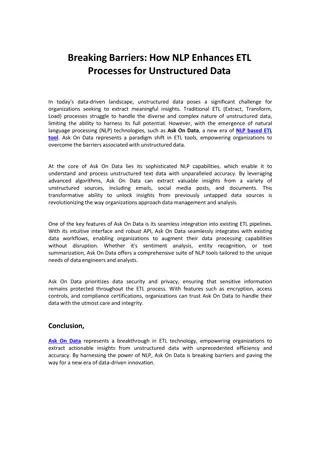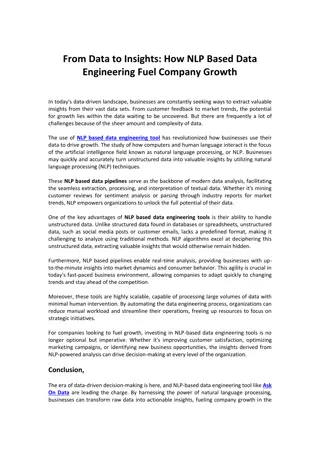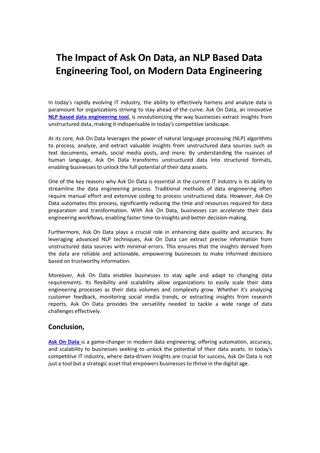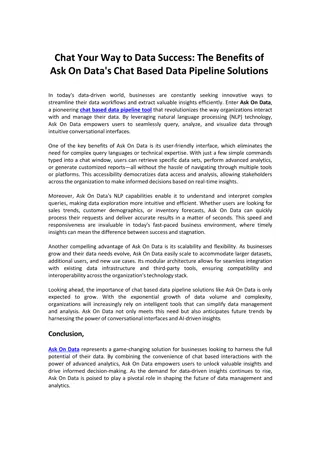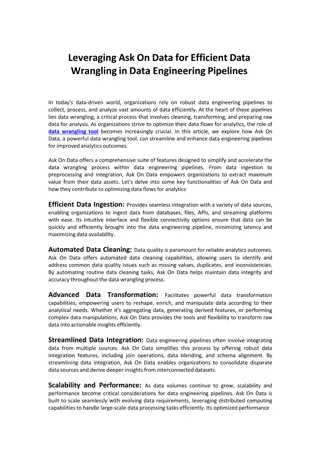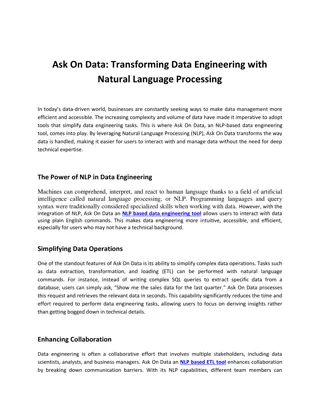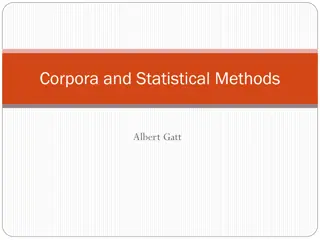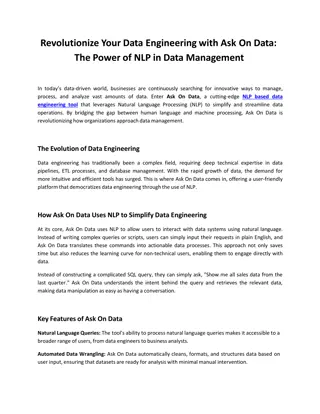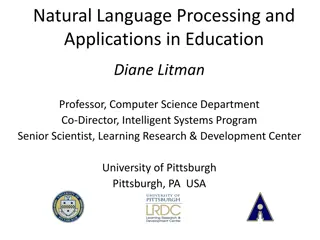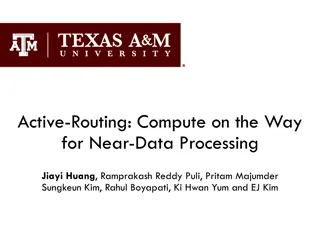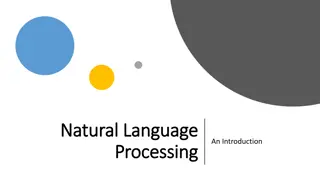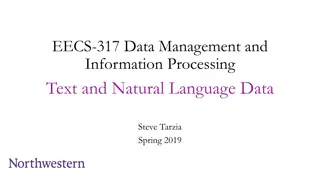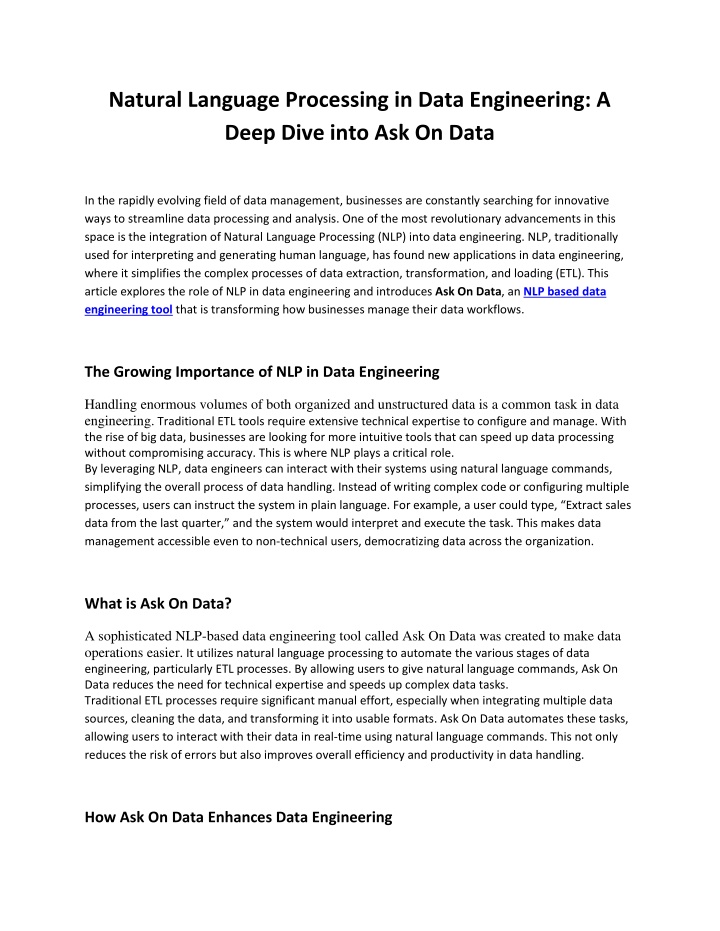
Natural Language Processing in Data Engineering A Deep Dive into Ask On Data
In the rapidly evolving field of data management, businesses are constantly searching for innovative ways to streamline data processing and analysis. One of the most revolutionary advancements in this space is the integration of Natural Language Proc
Download Presentation

Please find below an Image/Link to download the presentation.
The content on the website is provided AS IS for your information and personal use only. It may not be sold, licensed, or shared on other websites without obtaining consent from the author. If you encounter any issues during the download, it is possible that the publisher has removed the file from their server.
You are allowed to download the files provided on this website for personal or commercial use, subject to the condition that they are used lawfully. All files are the property of their respective owners.
The content on the website is provided AS IS for your information and personal use only. It may not be sold, licensed, or shared on other websites without obtaining consent from the author.
E N D
Presentation Transcript
Natural Language Processing in Data Engineering: A Deep Dive into Ask On Data In the rapidly evolving field of data management, businesses are constantly searching for innovative ways to streamline data processing and analysis. One of the most revolutionary advancements in this space is the integration of Natural Language Processing (NLP) into data engineering. NLP, traditionally used for interpreting and generating human language, has found new applications in data engineering, where it simplifies the complex processes of data extraction, transformation, and loading (ETL). This article explores the role of NLP in data engineering and introduces Ask On Data, an NLP based data engineering tool that is transforming how businesses manage their data workflows. The Growing Importance of NLP in Data Engineering Handling enormous volumes of both organized and unstructured data is a common task in data engineering. Traditional ETL tools require extensive technical expertise to configure and manage. With the rise of big data, businesses are looking for more intuitive tools that can speed up data processing without compromising accuracy. This is where NLP plays a critical role. By leveraging NLP, data engineers can interact with their systems using natural language commands, simplifying the overall process of data handling. Instead of writing complex code or configuring multiple processes, users can instruct the system in plain language. For example, a user could type, Extract sales data from the last quarter, and the system would interpret and execute the task. This makes data management accessible even to non-technical users, democratizing data across the organization. What is Ask On Data? A sophisticated NLP-based data engineering tool called Ask On Data was created to make data operations easier. It utilizes natural language processing to automate the various stages of data engineering, particularly ETL processes. By allowing users to give natural language commands, Ask On Data reduces the need for technical expertise and speeds up complex data tasks. Traditional ETL processes require significant manual effort, especially when integrating multiple data sources, cleaning the data, and transforming it into usable formats. Ask On Data automates these tasks, allowing users to interact with their data in real-time using natural language commands. This not only reduces the risk of errors but also improves overall efficiency and productivity in data handling. How Ask On Data Enhances Data Engineering
Simplified ETL Processes:Ask On Datas biggest advantage lies in its ability to simplify the ETL process. With the help of NLP, users can automate data extraction, transformation, and loading tasks without having to write complex scripts. This makes Ask On Data an ideal NLP based ETL tool for businesses that deal with large volumes of data from various sources. User-Friendly Interface: Unlike traditional ETL tools, which require specialized training, Ask On Data offers an intuitive interface where users can give natural language commands. This eliminates the need for coding knowledge, making it easy for business analysts, marketers, and even executives to manage and query data without needing to involve technical teams. Improved Data Accessibility: By enabling natural language queries, Ask On Data makes data more accessible across different departments within an organization. Non-technical users can interact with data directly, reducing the dependency on data engineers for everyday tasks like report generation and data analysis. Real-Time Data Processing: Ask On Data supports real-time data integration, allowing businesses to work with up-to-date information. This feature is particularly useful for organizations that rely on live data for decision-making, such as e-commerce companies or financial institutions. Cost-Effectiveness: Ask On Data, an NLP based data engineering tool, lowers the expenses and time incurred by manual data processing. The Future of NLP in Data Engineering The need for effective data engineering solutions will only increase as companies expand. Tools like Ask On Data, which combine the power of NLP with data management, are at the forefront of this transformation. The ability to interact with data systems using natural language commands opens up new possibilities for innovation in data engineering, making the process more accessible, efficient, and error-free. In the future, we can expect NLP-based tools like Ask On Data to evolve further, incorporating advanced features like machine learning and AI-driven insights. This will enable more predictive analytics, automated decision-making, and enhanced data governance. Conclusion NLP is revolutionizing the way businesses handle data, making complex processes more intuitive and efficient. Ask On Data, an NLP-based ETL tool, is leading this change by offering businesses a way to simplify their data workflows using natural language commands. By reducing technical complexity, improving accessibility, and speeding up ETL processes, Ask On Data is transforming data engineering into a more user-friendly and efficient function. As NLP continues to evolve, tools like Ask On Data will be instrumental in helping organizations stay ahead in the competitive data-driven landscape.



